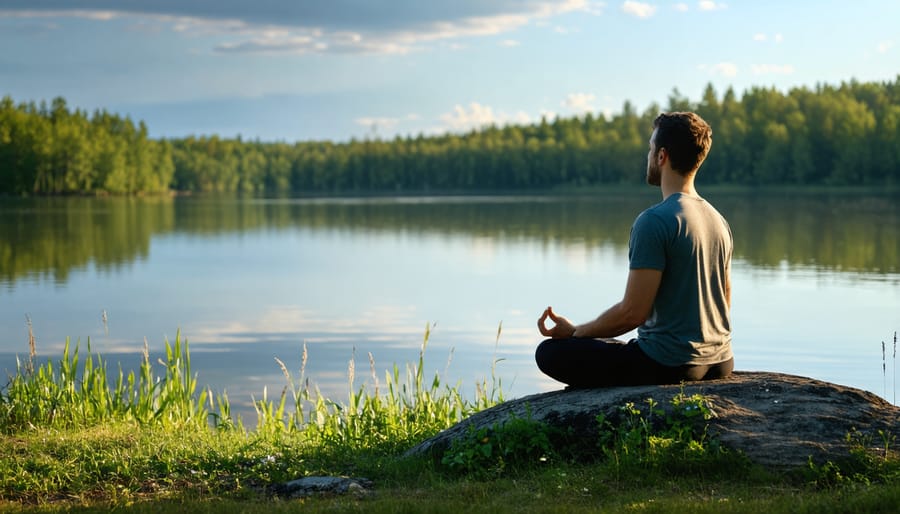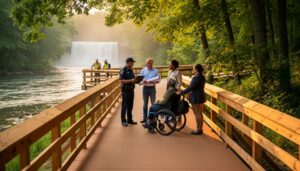Step outside into Ontario’s vast network of parks for an immediate mood boost backed by compelling research. Studies show just 20 minutes of park time significantly reduces stress hormones and blood pressure, while boosting mental clarity and emotional wellbeing. Our provincial parks offer accessible nature experiences year-round, from gentle walking trails to immersive forest bathing programs.
The connection between green spaces and mental health isn’t just feel-good philosophy – it’s science. Regular park visits correlate with lower rates of anxiety and depression, improved sleep quality, and enhanced cognitive function. In fact, doctors across Ontario now prescribe “park time” as part of mental health treatment plans, recognizing nature’s powerful therapeutic effects.
Whether you’re seeking solitude on a quiet morning trail, joining a guided mindfulness walk, or simply finding a peaceful spot to watch the sunset, Ontario’s parks offer natural sanctuaries for mental wellness. These green spaces serve as vital refuges from our increasingly digital world, providing essential opportunities to disconnect, decompress, and reconnect with both nature and ourselves.

Nature’s Medicine: The Science Behind Parks and Mental Wellness
Stress Reduction in Green Spaces
Ever wondered why you feel more relaxed after a walk in the park? Science has the answer! Research shows that spending time in green spaces significantly reduces cortisol – our body’s main stress hormone. In fact, just 20 minutes of nature exposure can help lower your stress levels to a more manageable state.
Picture this: you’re walking along a peaceful trail, breathing in the fresh forest air, and listening to birds chirping overhead. Your body naturally responds to this environment by lowering those pesky stress hormones. Studies have found that people who regularly visit parks and natural areas have lower average cortisol levels compared to those who spend most of their time indoors.
Here in Ontario’s parks, you’re surrounded by the perfect stress-busting environment. The combination of natural light, fresh air, and the gentle sounds of nature creates what scientists call a “restorative environment.” Whether you’re taking a quick lunchtime stroll or spending a full day hiking, you’re giving your body and mind a natural reset button.
Pro tip: Try forest bathing – simply sit quietly in nature for 15-20 minutes. It’s a simple yet powerful way to reduce stress and improve your overall well-being.
The ‘Blue Mind’ Effect of Ontario’s Waterfront Parks
There’s something magical about being near water, and Ontario’s waterfront parks perfectly capture this enchanting effect. Scientists call it the “Blue Mind” – that sense of calm and contentment we feel when we’re close to lakes, rivers, or waterfalls. From the thundering curtains of Niagara Falls to the serene shores of Lake Superior, our waterfront parks offer natural therapy for busy minds.
Studies show that spending time near water can lower stress hormones, reduce anxiety, and improve overall mental clarity. The gentle lapping of waves at Sandbanks Provincial Park or the peaceful shoreline of Bruce Peninsula National Park creates a natural meditation space, helping visitors disconnect from daily stresses and reconnect with themselves.
The combination of negative ions from moving water and the rhythmic sounds of waves creates a deeply relaxing environment. Whether you’re watching sunset over Lake Ontario at Presqu’ile Provincial Park or kayaking through the calm waters of Georgian Bay Islands, these blue spaces offer a unique form of nature therapy that’s freely available to all visitors.
Pro tip: For maximum benefit, try spending at least 20 minutes by the water. Even a quick lunch break at your local waterfront park can provide a meaningful mental refresh.
Mental Health Programs in Ontario Parks

Guided Mindfulness Walks
Throughout Ontario’s parks, guided mindfulness walks offer a perfect blend of nature connection and mental wellness practice. These structured programs, led by trained park naturalists, combine gentle walking with mindful awareness exercises, helping participants slow down and truly absorb the healing qualities of nature.
Bruce Peninsula National Park hosts weekly “Forest Bathing Walks” during summer months, where small groups explore the ancient cedar forests while practicing breathing exercises and sensory awareness. In Algonquin Park, the “Dawn Chorus Mindfulness Walk” takes early risers through misty trails while incorporating meditation stops at scenic lookouts.
Several urban parks have jumped on board too. High Park in Toronto offers free “Mindful Moments in Nature” walks every Saturday morning, perfect for city dwellers seeking a mental reset. The Rouge National Urban Park provides specialized mindfulness programs for newcomers to Canada, helping them connect with their new home through nature.
For those new to mindfulness walking, many parks offer beginner-friendly sessions that teach basic techniques. These usually run for about 90 minutes and include simple exercises like mindful breathing, observation practices, and gentle movement. Most programs are free with park admission, though some specialty sessions might require advance registration.
Pro tip: Check the Ontario Parks website or visitor centers for seasonal program schedules, as offerings vary throughout the year. Many parks also provide self-guided mindfulness walk brochures for those who prefer to practice independently.
Therapeutic Recreation Activities
Ontario Parks offers a variety of structured activities designed to boost mental wellness through nature connection. From guided meditation walks to forest bathing sessions, these rec classes that recharge mind and body are led by trained professionals who understand the healing power of nature.
Join a morning yoga session at Algonquin’s Lake of Two Rivers, where the sound of gentle waves creates the perfect backdrop for mindful movement. Try your hand at therapeutic art workshops, where park naturalists guide you in creating nature-inspired pieces while fostering a deeper connection with the environment.
Many parks now offer mental health walking groups, where you can connect with others while exploring gentle trails. These guided experiences are perfect for beginners and those seeking a supportive community. During summer months, look for specialized programs like eco-therapy sessions and stress-relief nature walks.
For families, there are kid-friendly wellness activities that teach young ones about mindfulness through fun, nature-based games. Senior-specific programs focus on gentle movement and social connection in natural settings.
Pro tip: Most therapeutic activities are included with your daily park pass, but some specialized programs require pre-registration. Check your chosen park’s event calendar seasonally, as programs often change with the weather and seasons.
Accessibility Features for Mental Wellness
Quiet Zones and Sensory-Friendly Areas
Ontario’s parks offer peaceful havens where visitors can escape the daily hustle and find their inner calm. Many provincial parks have created designated quiet zones – serene spaces specifically designed for meditation, reflection, and mental restoration. These areas are typically set back from busy trails and facilities, offering natural sound barriers through thoughtful landscaping and vegetation.
Look for meditation gardens in parks like Algonquin, where benches are strategically placed in tranquil forest clearings. These spots are perfect for practicing mindfulness or simply sitting quietly with your thoughts. Some parks have even developed sensory-friendly trails with minimal signage and reduced stimuli, making them ideal for visitors who may feel overwhelmed in busier areas.
For the best experience, visit these quiet zones during off-peak hours – early mornings or weekday afternoons tend to be most peaceful. Pack a journal, bring a meditation cushion, or simply find a comfortable spot on a fallen log. Remember to silence your phone and embrace the therapeutic sounds of nature: rustling leaves, gentle streams, and birdsong will become your natural soundtrack for relaxation.
Pro tip: Ask park staff about designated quiet areas when you arrive – they often know hidden spots that aren’t marked on main maps!

Mental Health First Aid Stations
Ontario Parks has taken a proactive approach to mental wellness by establishing dedicated Mental Health First Aid stations throughout select park locations. These welcoming spaces are staffed by trained professionals who understand the unique challenges visitors might face while connecting with nature.
You’ll find these stations strategically placed near major trailheads and visitor centers in parks like Algonquin, Killarney, and Pinery. Each station offers a quiet space for meditation, emotional support resources, and trained staff who can assist if you’re feeling overwhelmed or anxious during your visit.
The stations are equipped with comfortable seating, calming activities, and informational materials about mental health and nature therapy. They’re open during regular park hours, and services are included with your park entry fee. For immediate support, you can also find emergency contact information and helpline numbers posted at every station.
Remember to check the park’s website or visitor center for specific station locations and operating hours, as these may vary seasonally. Don’t hesitate to stop by – these spaces are designed to be judgment-free zones where everyone is welcome to take a mental health break.
Planning Your Mental Wellness Visit
Best Times to Visit for Tranquility
For the most serene park experiences, timing is everything. Early mornings, particularly just after sunrise, offer a magical combination of crisp air, wildlife activity, and minimal crowds. These golden hours are perfect for meditation, photography, or simply soaking in nature’s awakening.
If you’re looking to explore some of the hidden gems in Ontario Parks, plan your visits for weekdays rather than weekends. Tuesday through Thursday typically see fewer visitors, allowing for more intimate connections with nature.
Seasonal timing can also enhance your peaceful experience. Fall weekdays, especially in September and October, provide stunning colors without the summer crowds. Early spring, just as the snow melts, offers a unique tranquility as nature rebounds from winter.
For evening enthusiasts, consider visiting during the “golden hour” before sunset. This time not only offers beautiful lighting but also tends to be quieter as day visitors head home. Many parks remain open until sunset, providing perfect opportunities for evening walks or peaceful contemplation.
Weather can be your ally in finding solitude. While rainy days might seem uninviting, they often provide the most peaceful experiences – just bring appropriate gear and embrace the calming sound of rainfall in nature. Light drizzle tends to keep crowds away while creating a cocoon-like atmosphere perfect for reflection and rejuvenation.
Pro tip: Check park websites for special events or peak seasons to avoid unexpectedly busy days. Some parks offer early-access permits for photographers and nature enthusiasts, providing exclusive morning access before regular operating hours.
Essential Items for Mental Wellness Activities
Before heading out to enjoy the mental wellness benefits of Ontario’s parks, packing the right items can make your experience much more rewarding. Start with comfortable, weather-appropriate clothing and sturdy walking shoes – you’ll want to move freely as you explore nature’s therapeutic spaces.
A reusable water bottle is essential to stay hydrated, while healthy snacks like nuts and fruit can help maintain your energy levels during mindful walks or meditation sessions. Don’t forget to pack a comfortable sitting pad or lightweight blanket – perfect for forest bathing or finding a quiet spot to practice mindfulness exercises.
For recording your thoughts and experiences, bring along a small journal and pen. Many people find that combining nature observation with journaling amplifies the mental health benefits of their park visits. A pair of binoculars can enhance your connection with wildlife, while a camera (even just your phone) helps capture peaceful moments to revisit later.
Consider bringing along items that support your preferred wellness activities: a yoga mat for outdoor stretching, meditation cushion for comfort, or noise-canceling headphones if you enjoy guided nature meditations. Hand sanitizer and basic first aid supplies provide peace of mind, while eco-friendly insect repellent and sunscreen protect you without harming the environment.
Pro tip: Pack everything in a comfortable daypack that distributes weight evenly – your back will thank you later!
As we’ve explored throughout this article, Ontario Parks serve as more than just scenic getaways – they’re vital sanctuaries for our mental well-being. These natural spaces have become increasingly important in our fast-paced world, offering a powerful antidote to daily stress and mental fatigue. Whether it’s a peaceful morning walk at Algonquin, a weekend camping trip at Killarney, or simply sitting by the shores of Lake Ontario, these moments in nature can dramatically improve our mood and mental clarity.
The accessibility of Ontario’s parks system means that mental health support through nature is available to everyone, regardless of their experience level or physical abilities. Many parks are just a short drive away from major urban centers, making it possible to reconnect with nature even during a busy work week.
Looking ahead, Ontario Parks continues to expand its mental health initiatives, from guided mindfulness walks to educational programs about nature’s healing benefits. These efforts reflect a growing understanding of the essential connection between environmental conservation and community well-being.
Remember, your mental health journey can start with something as simple as a 20-minute visit to your nearest provincial park. By making these natural spaces part of our regular routine, we invest not just in our own mental wellness, but in the health of our entire community. The parks are here for you – step outside, breathe in the fresh air, and let nature work its magic.














+ There are no comments
Add yours